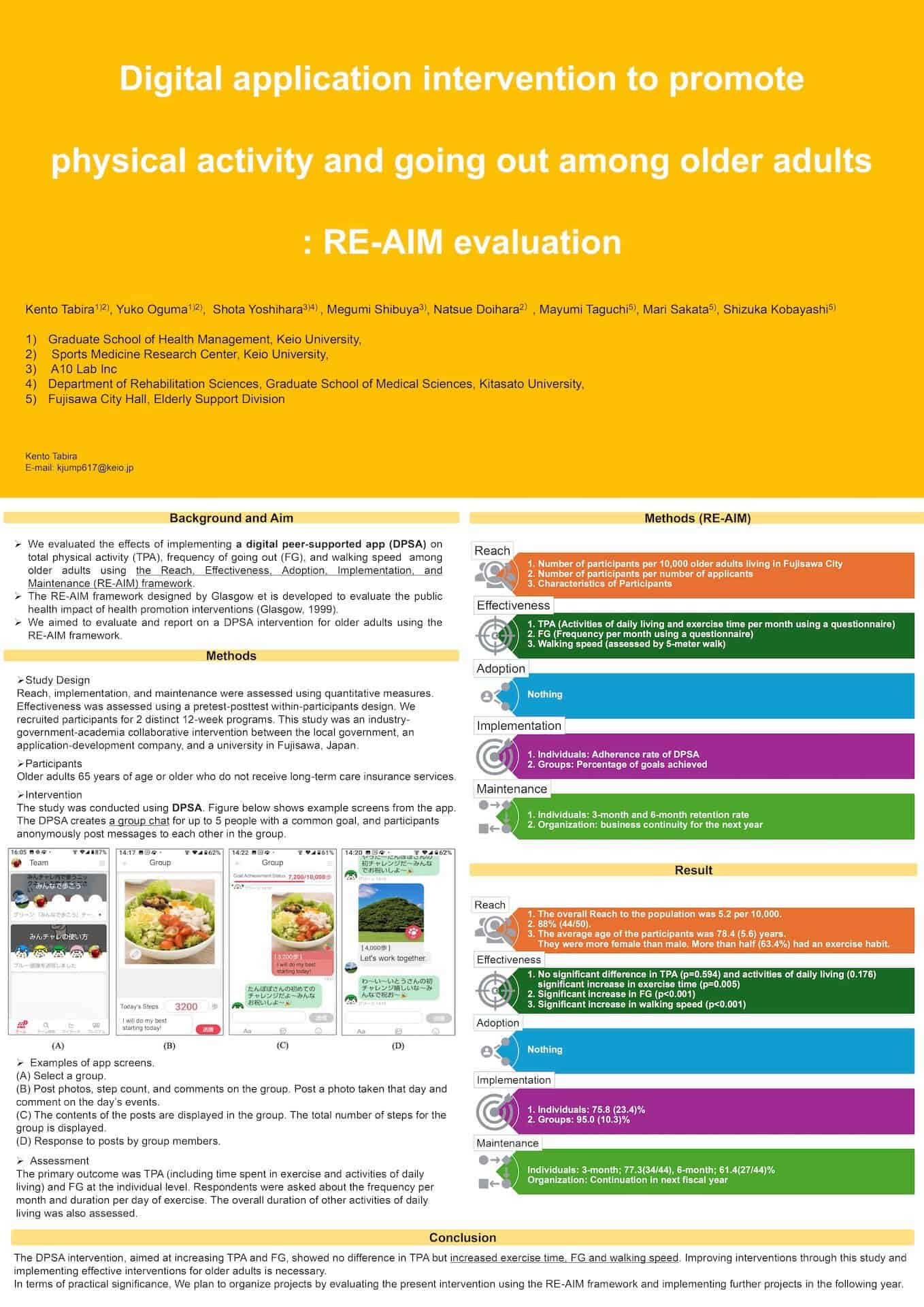
Digital application intervention to promote physical activity and going out among older adults: RE-AIM evaluation
Abstract Overview
Background: Peer support-based interventions are a common strategy for promoting health-related behavioral changes. With digital technology advancements, interventions using digital technology may be acceptable to older adults. Here, we evaluated the effects of implementing a digital peer-supported application (DPSA) on total physical activity (TPA) and frequency of going out (FG) among older adults using the Reach, Effectiveness, Adoption, Implementation, and Maintenance (RE-AIM) framework.
Purpose: To evaluate and report on a DPSA intervention for older adults using the RE-AIM framework.
Methods: This study was an industry-government-academia collaborative intervention between the local government, an application-development company, and a university in Fujisawa, Japan, targeting older adults who were not receiving long-term care assistance. The 3-month intervention was categorized into two terms. We assessed the reach, implementation, and maintenance information provided by the government and the company. Furthermore, we evaluated its effectiveness by adopting a pretest-posttest within-participants design, with TPA and FG using questionnaires as the primary outcome (no adoption setting).
Results: The overall Reach to the population was 5.2 per 10,000. The participants’ mean age was 78.4 (standard deviation, 5.9) years, and 31 (75.6%) were females. Regarding Implementation, the intervention adherence rate was 77.3%. No significant difference was found in TPA (p=0.176) regarding Effectiveness; however, a significant increase was found in exercise time (p=0.005). A significant increase was observed in FG (p<0.001), while Maintenance is still being tracked.
Conclusions: The DPSA intervention, aimed at increasing TPA and FG, showed no difference in TPA but increased exercise time and FG. Improving interventions through this study and implementing effective interventions for older adults is necessary.
Practical implications: We plan to organize projects by evaluating the present intervention using the RE-AIM framework and implementing further projects in the following year.
Funding: This study was financially supported by the Elderly Support Division of the Fujisawa City government.

Additional Authors
Name: Yuko Oguma
Affiliation: Sports Medicine Research Center, Keio University, Kanagawa, Japan
Presenting Author: no
Name: Shota Yoshihara
Affiliation: A10 Lab Inc, Tokyo, Japan
Presenting Author: no
Name: Megumi Shibuya
Affiliation: A10 Lab Inc, Tokyo, Japan
Presenting Author: no
Name: Natsue Doihara
Affiliation: Sports Medicine Research Center, Keio University, Kanagawa, Japan
Presenting Author: no
Name: Mayami Taguchi
Affiliation: Fujisawa City Hall, Elderly Support Division, Kanagawa, Japan
Presenting Author: no
Name: Mari Sakata
Affiliation: Fujisawa City Hall, Elderly Support Division, Kanagawa, Japan
Presenting Author: no
Name: Shizuka Kobayashi
Affiliation: Fujisawa City Hall, Elderly Support Division, Kanagawa, Japan
Presenting Author: no
